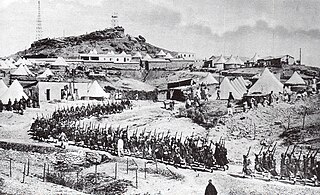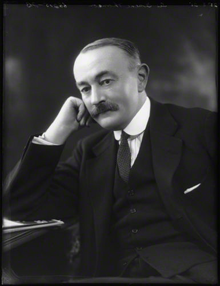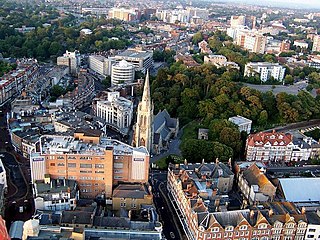
Edward George Villiers Stanley, 17th Earl of Derby,, styled Mr Edward Stanley until 1886, then The Hon Edward Stanley and then Lord Stanley from 1893 to 1908, was a British soldier, Conservative politician, diplomat, and racehorse owner. He was twice Secretary of State for War and also served as British Ambassador to France.

Field Marshal Herbert Charles Onslow Plumer, 1st Viscount Plumer, was a senior British Army officer of the First World War. After commanding V Corps at the Second Battle of Ypres in April 1915, he took command of the Second Army in May 1915 and in June 1917 won an overwhelming victory over the German Army at the Battle of Messines, which started with the simultaneous explosion of a series of mines placed by the Royal Engineers' tunnelling companies beneath German lines, which created 19 large craters and was described as the loudest explosion in human history. He later served as Commander-in-Chief of the British Army of the Rhine and then as Governor of Malta before becoming High Commissioner of the British Mandate for Palestine in 1925 and retiring in 1928.

Maurice Pascal Alers Hankey, 1st Baron Hankey, was a British civil servant who gained prominence as the first Cabinet Secretary and who later made the rare transition from the civil service to ministerial office. He is best known as the highly efficient top aide to Prime Minister David Lloyd George and the War Cabinet that directed Britain in the First World War.
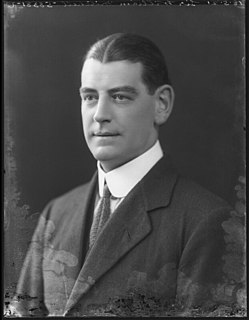
William Lowson Mitchell-Thomson, 1st Baron Selsdon, known as Sir William Mitchell-Thomson, 2nd Baronet, from 1918 to 1932, was a Scottish politician who served as British Postmaster-General from 1924 till 1929.
Robert Henry Brand, 1st Baron Brand, was a British civil servant and businessman.
The Ecclesiastical Household is a part of the Royal Household of the sovereign of the United Kingdom. Reflecting the different constitutions of the churches of England and Scotland, there are separate households in each nation.
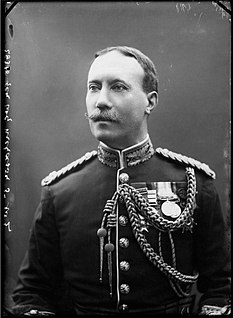
Field Marshal William Gustavus Nicholson, 1st Baron Nicholson, was a British Army officer who served in the Second Anglo-Afghan War, the Mahdist War, the Third Anglo-Burmese War, the Second Boer War and the First World War. He became Chief of the Imperial General Staff and was closely involved in the reorganisation of the British Army in the early years of the 20th century.

Joseph Albert Pease, 1st Baron Gainford, PC, DL, JP, known as Jack Pease, was a British businessman and Liberal politician. He was a member of H. H. Asquith's Liberal cabinet between 1910 and 1916 and also served as Chairman of the BBC between 1922 and 1926.
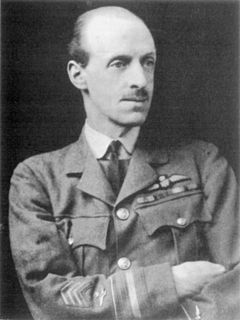
Air Vice Marshal Sir Frederick Hugh Sykes, was a British military officer and politician.

Admiral of the Fleet The Honourable Sir Hedworth Meux, formerly Hedworth Lambton was a Royal Navy officer. As a junior officer he was present at the bombardment of Alexandria during the Anglo-Egyptian War.
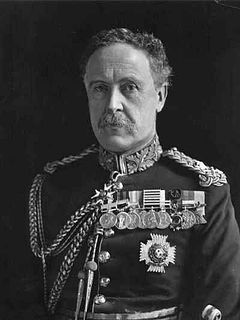
General Sir Neville Gerald Lyttelton, was a British Army officer from the Lyttelton family who served against the Fenian Raids, and in the Anglo-Egyptian War, the Mahdist War and the Second Boer War. He was Chief of the General Staff at the time of the Haldane Reforms and then became Commander-in-Chief, Ireland.

General Sir Alfred Gaselee,, was a soldier who served in the Indian Army.

Brigadier-General Sir William Bromley-Davenport, was a British soldier, footballer and Conservative politician. He fought with distinction in both the Second Boer War and the First World War. An MP from 1886 to 1906, he held political office under Arthur Balfour as Financial Secretary to the War Office from 1903 to 1905.

Sir Ronald Charles Lindsay was a British civil servant and diplomat. He was Ambassador to Turkey from 1925 to 1926 and to Germany from 1926 to 1928, Permanent Under-Secretary for Foreign Affairs from 1928 to 1930 and Ambassador to the United States from 1930 to 1939.

Sir George Russell Clerk was a British diplomat and Privy Counsellor who ended his career as Ambassador to France from 1934 to 1937, after seven years as Ambassador to Turkey, one as Ambassador to Belgium and seven as Ambassador to The Czechoslovak Republic. His name is pronounced as if spelt Clark.

General Sir Edmund George Barrow (1852–1934) was a senior British Army officer who went on to be Military Secretary to the India Office.
The New Year Honours 1901 were appointments to various orders and honours of the United Kingdom and British India.
Sir William Douglas Young was a colonial administrator from British Columbia who was Governor of the Falkland Islands from 1915 to 1920.
Sir Oswyn Alexander Ruthven Murray was a British civil servant who spent most of his career at the Admiralty, eventually serving as Permanent Secretary from 1917 until 1936.



